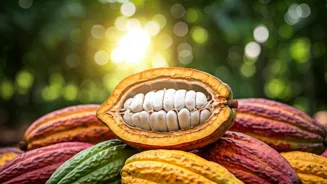Aging and Biology
The biological processes related to aging are complex, marked by the accumulation of cellular damage and the gradual decline in the body's ability to repair
itself. Aging is often associated with increased inflammation, reduced cellular function, and the accumulation of harmful byproducts within cells. One significant marker used in aging research is a particular biochemical indicator. This specific marker offers valuable insights into the speed of aging. It is used to assess how effectively the body manages cellular health and the rate at which it experiences age-related changes. Many studies focus on identifying and measuring this marker as a way to evaluate the impact of interventions designed to slow or reverse aging. The marker is a key area of research due to its link to overall health and longevity.
The Cocoa Connection
Cocoa, the base ingredient for chocolate, is rich in bioactive compounds known as flavanols. These compounds have displayed promising effects in various health areas, including heart health and cognitive function. In the realm of aging, cocoa flavanols have emerged as potential allies. Research suggests these flavanols can act as antioxidants, counteracting cellular damage caused by free radicals. Moreover, flavanols might influence cellular signaling pathways implicated in aging. This capacity to impact cellular processes has made cocoa extract a focal point in research focused on healthy aging. The natural origin and the potential health benefits of cocoa extract are enticing for researchers and health-conscious individuals alike. Studies are underway to determine the optimal dosage and formulation to maximize the benefits of cocoa extract.
Study's Key Findings
A specific study examined the effect of a cocoa extract supplement on a key biological marker of aging. The study carefully monitored participants while assessing the impact of the supplement. The findings were remarkable; the cocoa extract supplement showed a notable reduction in the targeted aging marker. This finding suggests that the supplement could positively affect the aging process at a fundamental level. The researchers observed that the supplement led to improved cellular health. This observation reinforces the belief that dietary interventions can play a crucial role in supporting healthy aging. The success of the cocoa extract supplement underscores the potential of natural compounds in influencing human health.
Implications and Outlook
The outcomes of the study carry significant implications. The reduction in the aging marker signals the potential for cocoa extract to act as an anti-aging agent. This outcome opens the door to more research into the benefits of cocoa flavanols in human health. Researchers are keen to investigate the long-term effects, optimal dosages, and potential benefits of the supplement for different demographics. Besides the immediate scientific interest, there is a broader perspective. This study highlights the growing recognition of the potential of natural compounds in promoting health and well-being. These findings support the case for a more holistic approach to aging, which emphasizes the use of natural supplements in support of overall health. The future of cocoa extract in the anti-aging arena looks promising.


















